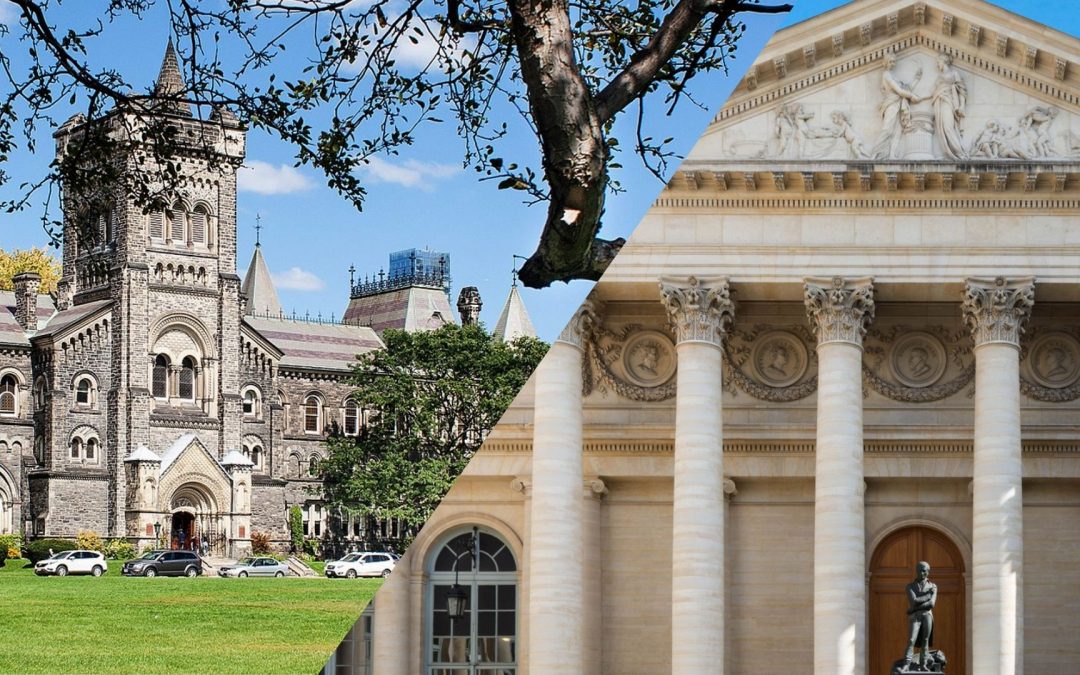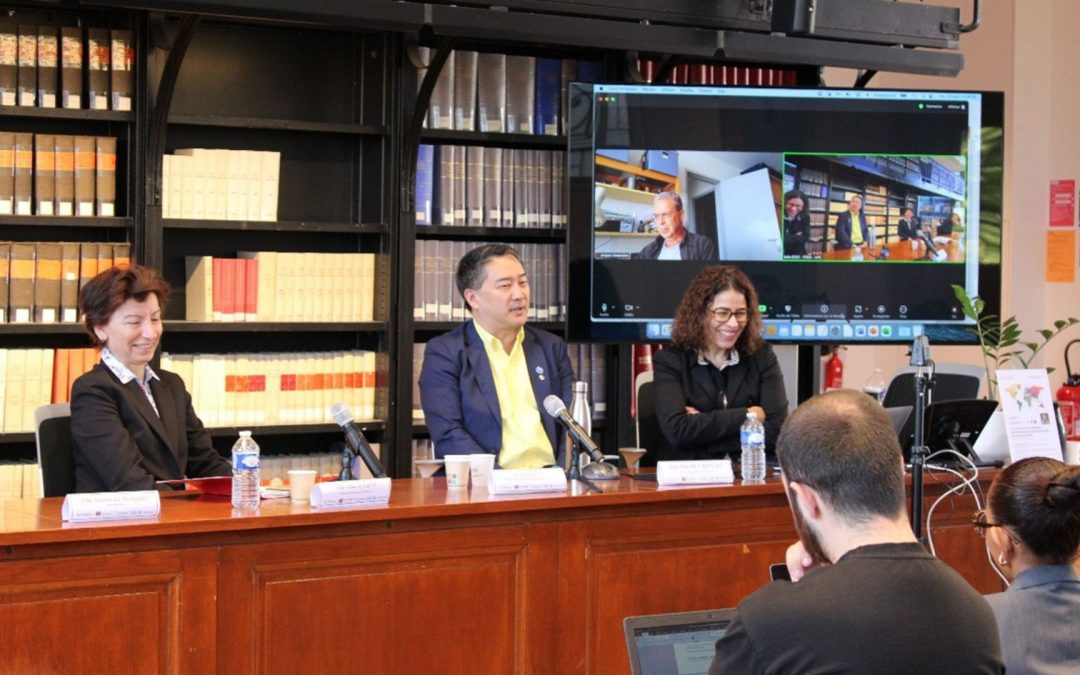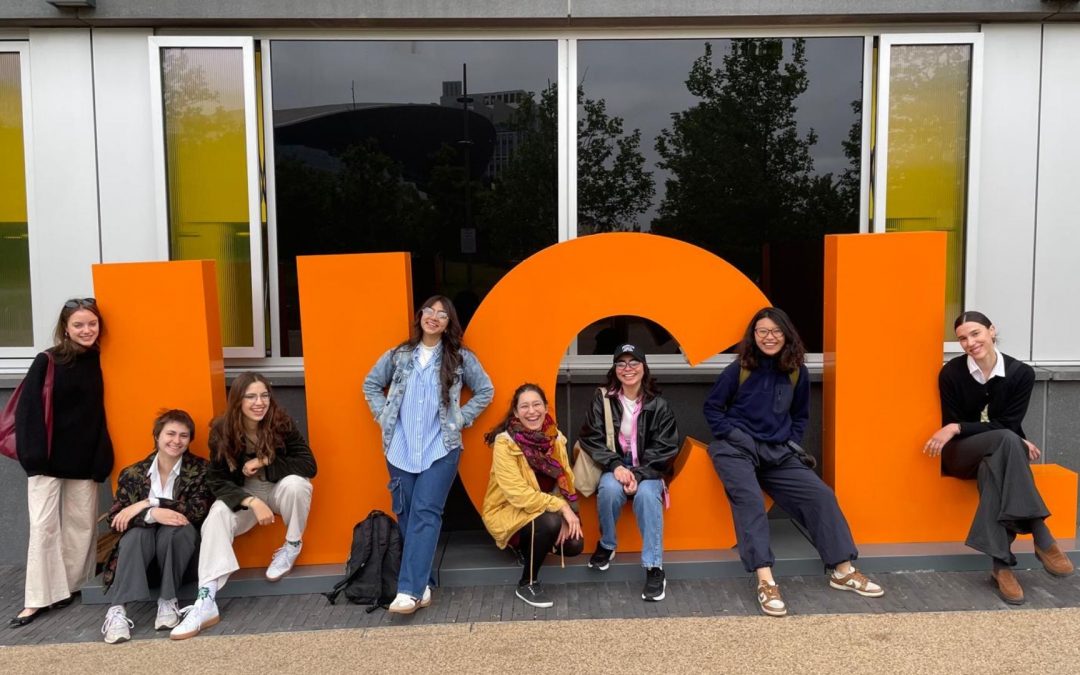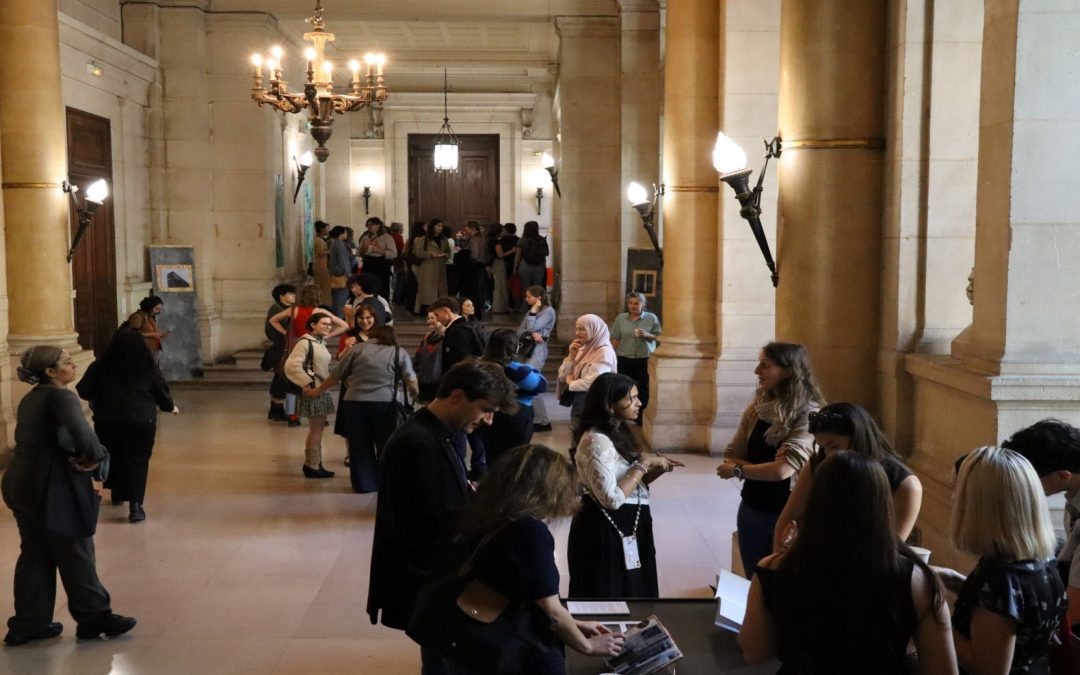Within the framework of the Strategic Partnership InnovEd4TS (Innovative Education for Transferable Skills), five member universities of Circle U. Alliance (Humboldt, UCLouvain, Oslo, Aarhus and Paris) together with the University of Lisbon launched their field missions as of October 2020.

From left to right Wolfgang Diecke, Benoît Raucent, Christine Jacqmot and Tina Bering Keiding working together on the field missions at UCLouvain.
The InnovEd4TS Strategic Partnership focuses on the analysis and the development of initiatives that promote the acquisition of transferable skills among students.
From October 2020 through to July 2021, the partners of the InnovEd4TS Strategic Partnership will conduct their field missions, starting at the University of Oslo. Due to the global pandemic, the visits which were initially planned on site, were held virtually.
The University of Oslo (UiO) presented the “Computing in (Science) Education” initiative which addresses the need for professionals to develop computational and digital skills by integrating these into compulsory education. These skills are taught in a disciplinary context so that computational literacy becomes a part of students’ professional identity. At UiO, all Bachelor programs in mathematics and natural sciences have an introductory context-adapted course in scientific programming which is mandatory for the students. This initiative therefore targets 3000 students of the science bachelor programs. In addition, programming is integrated into the curriculum of several master’s programs, encompassing about 200 master students yearly. Some students from the Faculty of Humanity have also started to take courses on programming as of Fall 2020 and the expansion of the initiative to more faculties is foreseen in the years to come.
The role of the Centre for Computing in Science Education (CCSE), one of Norway’s eight national centres of excellence in education, of its Director, Anders Malthe-Sørenssen and other professors working at the Centre (see below) has been central to this initiative. This international hub for research-based integration of computational methods in education has developed methods and materials in order to integrate programming in all science study programmes and adapt it to the disciplinary context.
This Flagship Initiative “Computing in Education” involves three transferable skills:

Problem solving

Digital Literacy

Creativity
Drawings by Benoit Raucent
The Booklet, supporting transferable skills
To kick off the session on Oslo’ Flagship Initiative, UCLouvain presented the booklet, explaining the methodology for completion of the tool by the professors and the five peer experts (see below). The tool served as the basis for group discussion on the transferable skills fostered by Oslo initiative. The booklet will be used as a supporting tool for the nine future field missions assessing the other Flagships in the other partner universities.
Digital Literacy and Computational Skills across disciplines, a key focus at the University of Oslo
At the University of Oslo, the virtual field mission consisted of a series of meetings and interviews with faculty, administrators and students involved in the integration of computing into the science bachelor programmes across disciplines. As the use of computing science is revolutionizing research, industry, government and society, and given the high demand for digital skills in today’s environment, all students should build solid skills in this area. At UiO, computing is introduced into education from the onset of the studies in scientific disciplines and more recently in humanities. The initiative has been integrated into the strategic work of the institution, in study programme design and in processes to improve the quality of education thanks to the work of the Centre for Computing in Science Education.
Digital versus computational literacy
“Computing in education” initiative therefore aims to integrate digital literacy as a transferable skill into curricula. During the discussion, the peer experts and the professors responsible for the Oslo initiative agreed that this initiative develops a more specific transferable skill that needs to be distinguished from the original framing of “digital literacy” namely “computational literacy”. While digital literacy focuses on a comprehensive mastery of digital environments, the development of computer literacy aims at providing students with basic or advanced programming skills.
“Programming is understanding”
The initiative also focuses on the development of “problem solving” skills, which are inherent in learning programming. “Programming is understanding” said Professor Morten Hjorth-Jensen, theoretical physicist at the university of Oslo and leader of the interdisciplinary master programme in Computational Science.
“One of the visiting peer experts, Michael E. Caspersen, honorary professor for Department of Computer Science and Founder of Centre for Computational Thinking at Aarhus University further commented: “We learn to write and write to learn; similarly, we should learn to code and code to learn. There is lot to learn from making errors in computational models.”
According to Lex Nederbragt, senior lecturer at the Department of Biosciences and responsible for the introduction of computational models applicable to biosciences, when students practise live coding errors together in the classroom, they collectively interpret and diagnose errors, thus improving learning outcomes.
Anne Vanet, a visiting peer expert, Vice President for Digital Transformation and Open Science at Université Paris Cité, said “I was very happy to participate as a peer expert in this virtual mission organized by the University of Oslo. The initiative presented by my Norwegian colleagues is very ambitious but also inspiring for Universite Paris Cité. At a time when we are implementing the Digital Master Plan, the focus on students’ digital skills seems to me essential because these skills will become central in tomorrow’s global workplace. The Oslo initiative also shows that programming courses can be useful for the learning of students from all disciplines by emphasizing reasoning, problem learning, and learning by error.”
A discipline-specific approach
The compulsory courses in computer science in the first year are adapted to each discipline in the bachelor’s programmes where they are included. The professors who teach programming come from the same discipline as the students they teach so that the students can see the application of what they do in their discipline. This discipline-specific approach also makes the programme much more attractive to the teachers themselves: “Pedagogical changes can be hard to sell, so integrating it into the core discipline is a more selling point,” says Knut Mørken, Dean of Studies.
The motivations are different according to disciplines and levels of study. Teaching programming to students in the humanities can be a strenuous effort for the learner. This is why the differences in levels between students in science and humanities are taken into account. It has also been suggested during the visit that additional support for students in humanities could be developed as the project goes on.
Targeting students at a young age
One of the major asset recognized by the peer experts is that the initiative targets Bachelor students. “It is easier to teach master and PhD students as they see the need in relation to a specific research question; however, it is also possible to change more minds when teaching undergraduate students” explains Dag Haug, professor of Linguistics.
The Students, achieving positive learning experiences and focusing on “creativity”
Testimonials from the students revealed that taking computing courses are useful and they would undoubtedly do them again. The classes do not take too much time away from other subjects.
There is a third transferable skill that the Oslo initiative brings to students and that they strongly emphasized, namely creativity. Students report that when doing the computational courses, they feel it brings out their creativity, authenticity and ability to solve problems. It is a ‘breath of fresh air”, a creative way to work, allowing them to practice their discipline authentically. Students take ownership over their own scientific process of learning and inquiring.
For students, it is nice to do something they can put into practice. It is different from learning mathematics, which is learnt from the blackboard. Yet most students have less experience with computing and programming and they feel they need to practice to understand it. Humanity students have expressed some difficulties while acknowledging the benefit of these courses. For them, programming is concrete and practical and the computational courses are different from most of theoretical classes they are used to taking.
Looking ahead
The 2-day virtual visit was engaging and appreciated by all the participants. The feedback was shared and allowed for fruitful exchanges. Going forward, the panel of peer experts agreed to complete the remaining sections of the booklet over the upcoming weeks. This filled booklet will be for the professors in charge of the initiative in Oslo to keep for future reference or should they want to introduce some of the suggestions made by their peers.
What is a “field mission”?
The six member universities of the InnovEd4TS Strategic Partnership are going to analyse ten Flagship Initiatives involving transferable skills identified by the InnovEd4TS Advisory Board (see the article “The strategic partnership on transferable skills InnovEd4TS finalizes its first stage”). In order to explore these initiatives, field missions involving a panel of experts from the different universities are being carried out.
The field mission is a peer learning exercise where professors leading the Flagship Initiative, peer experts reviewing the initiative, and students participating in it all have the opportunity to meet and learn during a two-day comprehensive virtual visit. The purpose is twofold: for the host to share and get interesting ideas and constructive comments on how to develop the initiative further ; for the peer experts in the panel to discover an innovative pedagogical initiative and get inspired to implement similar initiatives or to adapt it to their own context and fields of interest.
Leaders of the “Computing in Education” Initiative at the University of Oslo

Anders Malthe-Sørenssen is a Professor in physics at the University of Oslo. He is Director of the Center for Computing in Science Education, one of Norway’s eight national centres of excellence in education. He has developed an interdisciplinary Master’s programme in physics and geology and has received several national awards for the quality and innovative nature of his teaching.

Prof. Morten Hjorth-Jensen has developed two project-driven courses in computational science and Data analysis and machine learning. He is also the leader of the interdisciplinary master programme in Computational Science that spans all of the natural sciences.

Senior Lecturer Lex Nederbragt is responsible for the course “Introduction to computational models for biosciences”, which provides bioscience students with an introduction to programming and modeling in the context of bioscience.

Tor Ole Odden is a Postdoctoral Fellow at the Center for Computing in Science Education with a background in science education research who works on computational literacy. The impact on student attitudes and learning is studied Dr. Odden and the results from the studies is used in course development.

Knut Mørken is Dean of Studies at the Faculty of Mathematics and Natural Sciencesa and a Professor of Mathematics. He has both led the development of new study programs at the Faculty of mathematics and natural sciences and has hands-on experience from integrating programming in his own teaching.

Dag Haug is a professor of Linguistics at the University of Oslo and is responsible for the course on Computational thinking.
Peer Expert Panel

Michael E. Caspersen, for Aarhus University, is director of It-vest – networking universities (formal cooperation on IT education and research among Aarhus University and two other Danish universities) and honorary professor at Department of Computer Science at Aarhus University where he founded Center for Computational Thinking, now Center for Computational Thinking and Design. His areas of expertise are computing/informatics education, computational thinking, programming education, programming methodology and object-oriented programming.

Anne Vanet, for Université Paris Cité, is Vice President for Digital Transformation and Open Science, Professor of Biology at Université Paris Cité. She continues to lead the Geno Computing pole, a multidisciplinary team of five researchers and ten students in genetics, BM, bioinformatics, cheminformatics, chemistry, mathematics, oncology, virology, to manage bio big data.

Wolfgang Diecke for Humboldt-University, is a professor in politics and sociology. Before becoming the coordinator of the Bologna.lab at Humboldt-Universität in 2012, he variedly taught sociology, politics and the history of European thought and society at the (now) University of Northampton, and Ruskin College, Oxford. His current research interests are the development of (student) research competencies and organisational development in Higher Education.

Olivier Goletti, for the Université catholique de Louvain is a PhD Student in Computer Science Education at UCLouvain and Leiden. His research is on explicit and evidence-based instructional strategies in Computer Science and on high school teacher’s professional development through communities of practice.

Rui Agostinho, for the Universidade de Lisboa (ULisboa), is a professor in the Department of Physics at the Faculty of Sciences and a researcher of the Institute of Astrophysics and Space Sciences. Has developed a vast work in promoting scientific culture as a teacher, researcher, author and has received a national award in the field of Astronomy. His current activities and research include the Teaching of Physics at the ULisboa.
Students
Students with different perspectives, disciplines and experiences were selected during the field mission to meet with the peer experts and the leaders of Oslo initiative.
- Gulla Torvund, a second-year physics student in the Honours programme (the Honours programme is an interdisciplinary Bachelor programme at UiO). She is also a student member of the Center for Computing in Science Education leadership group.
- Karl Henrik Fredly, a master student in Computational Physics and a student member of the Center for Computing in Science Education leadership group.
- Henriette Johansen, a second-year philosophy student in the Honours programme, who is following the course “Computational thinking”.
The Booklet
How does the Booklet support the initiative ?
The Booklet is a tool which serves as the basis for group discussion on the transferable skills developed, acquired and future opportunities for the project group.
Strategic Partnership InnovEd4TS (Innovative Education for Transferable Skills), is five member universities of Circle U. Alliance : Humboldt University, UCLouvain, University of Oslo, University of Aarhus and Université Paris Cité along with the University of Lisbon
Read more

Results of the 2025 Call for Projects with the University of Toronto
The 2025 call for projects between Université Paris Cité and the University of Toronto met with great enthusiasm within the scientific communities of both institutions. Eighteen proposals were submitted by pairs of researchers; five projects were selected at the end...

Discussing Sustainability Standardization with Charles Cho, Professor of Sustainability Accounting at York University (Canada)
As part of the international program "Enseignant-Chercheur Invité", Charles H. Cho, PhD, CPA, Professor of Sustainability Accounting and holder of the Erivan K. Haub Chair in Business & Sustainability at the Schulich School of Business, York University, was...

EURIP Master’s Students at University College London Hackathon

From Paris to Singapore: a visual retrospective of the exhibition
On the 16th of May, Université Paris Cité hosted the exhibition evening for the programme Singapore: a Nexus of Nature, Culture, and the Arts. Centred around creativity, intercultural exchange, and environmental reflection, the event showcased the work of around...
